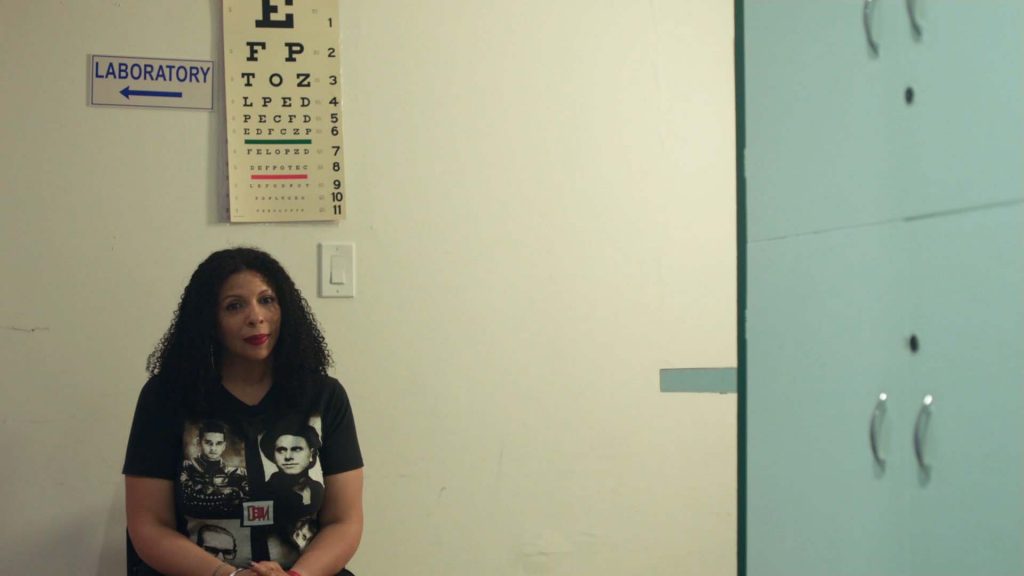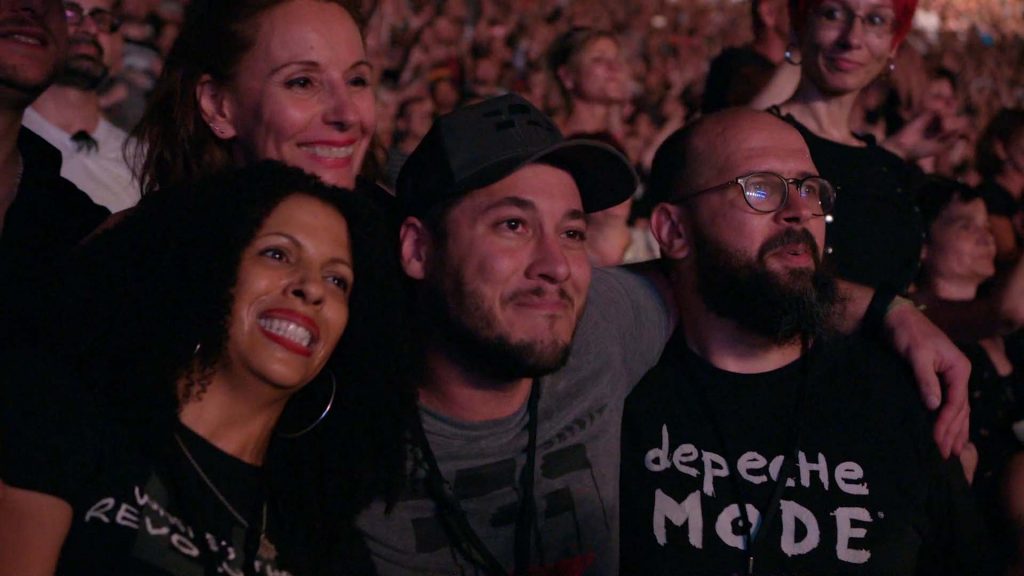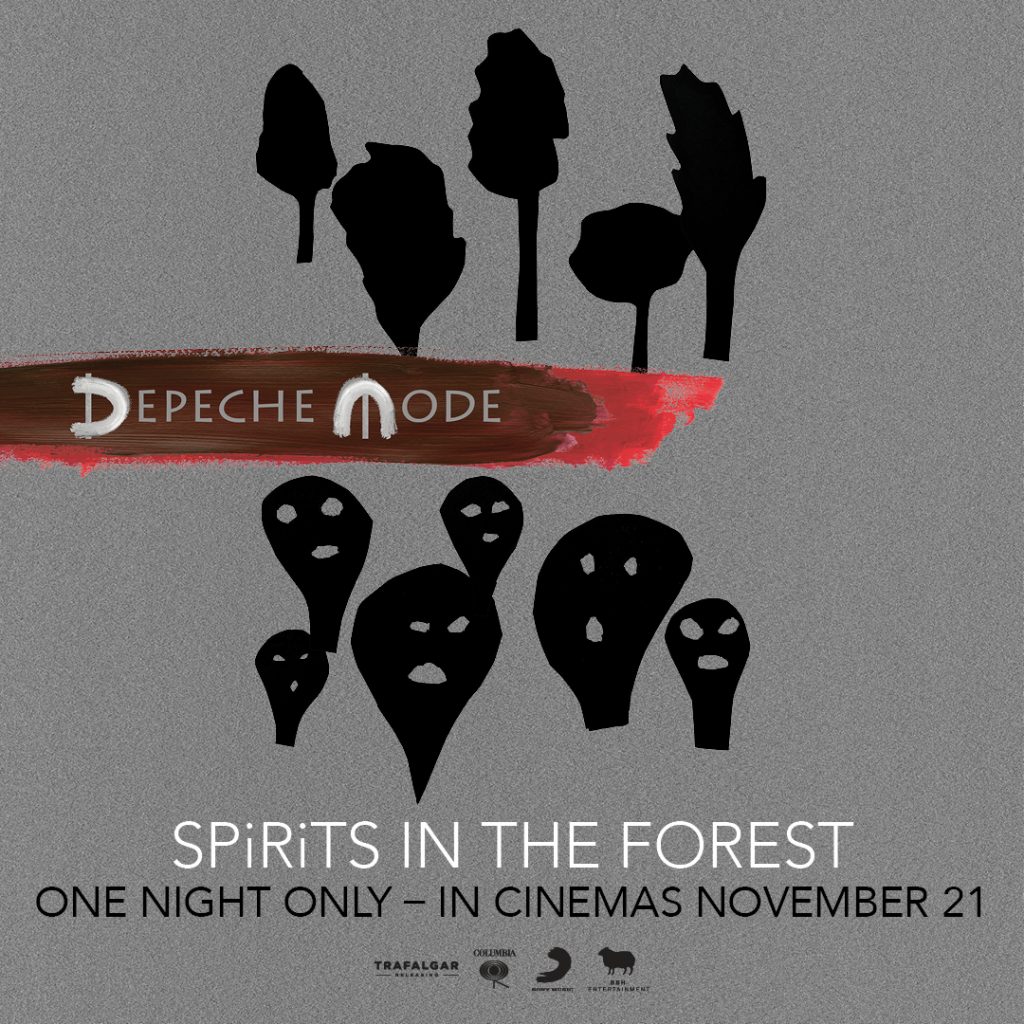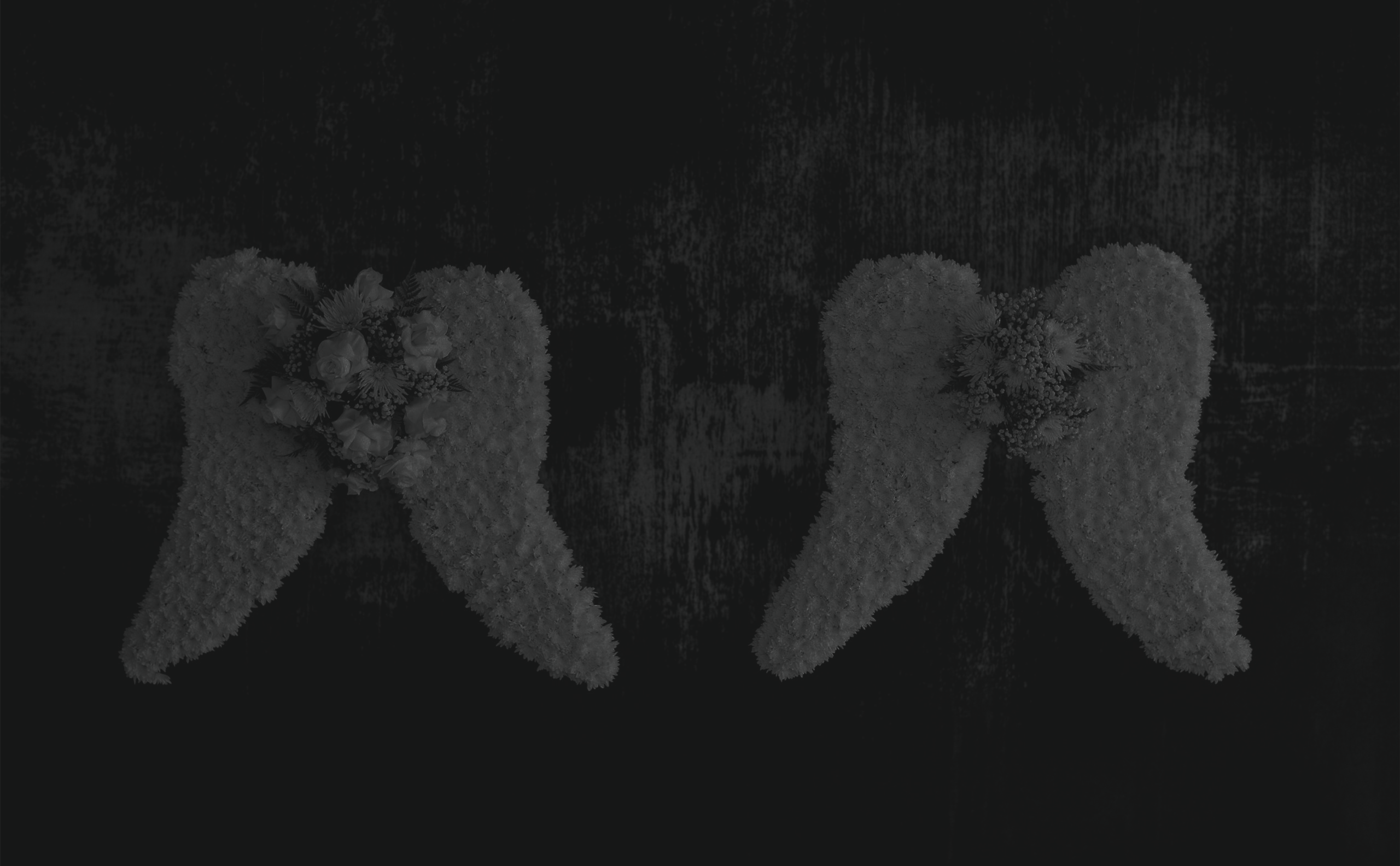Spirits In The Forest – The Fan Interviews. Part 3: Liz Dwyer

The third of our exclusive interviews ahead of the release of Spirits In The Forest is with Liz Dwyer who lives in Los Angeles. She spoke to Sean Salo in New York at a press screening of the film on 7th November.
How did you find out about the film? What did you think it would be? And did it match your expectations?
It was early April 2018, and I received an email with “Depeche Mode film opportunity” in the subject line. That’s one of those things that you immediately click on it. You see all the newsletters and everything in your inbox, and you’re like “not opening that…not opening that…Oh, I will open this!” It was a couple of days after April 1st, so I’m thinking ‘well it’s just like a late April Fools thing. What is happening?’ Also because they ask the question, “Would this be something you’d be interested in?” And I really couldn’t fathom what kind of real Depeche Mode fan would ever turn something like that down like, “This isn’t really my thing. I don’t wanna be involved with that.” But it didn’t really specify what exactly it would be. But living in LA and at the time working on a studio lot myself and there’s lots of stuff that happens, like people filming 30-minute shorts for YouTube or something that’s supposed to go on a Facebook page, or maybe something that’ll just be on a DVD. I didn’t really know what it would be, and it didn’t specify. But it didn’t really matter. I was down for whatever…anything associated with the band. So, yes absolutely. So they said, “we’ll be in touch,” and there would be long periods of time where I didn’t hear anything.
I think in that initial email to they had said something about going to Berlin. I thought, “OK, this is super cool and fun because I know lots of people who travel all around the world to see Depeche Mode and love doing that. I’ve never thought, “Let me go buy tickets to a concert in a foreign country!” So that was all right. But then I didn’t hear anything, and I thought maybe it wasn’t happening or maybe it really was a prank or something. [The LA-based film crew] got back in touch, and I think it was Prince Day because I remember I had a purple jacket on and a raspberry beret. We had a nice little Skype chat, but I don’t think I really was clear what their involvement would be with it or what their role was. I was like at work in my office and just mentally in the middle of my day, and I kind of switch gears. They’re asking me to tell them a little bit about my story with Depeche Mode, and about what I have written about for the Facebook Takeover and that experience. That was cool, but then they asked could they come over to my house maybe a week later, like, “OK, can we come over to your house to meet you and check the lighting?” And I’m like, “check the lighting for what?” So I left work, they came over. We have a nice little chat. I would try to give them snacks and things because, you know, they’re guests in my house. But again, I’m thinking like this is going to be a small little film.
Did they tell you Anton Corbijn would be involved?
No, no. They hadn’t told me anything. In hindsight, that was probably a good thing because at the time I might have freaked out significantly if I had known that.
So they weren’t sure which date they want to film here in L.A. They eventually got in touch and they wanted to do the very last few days than in June/very beginning in July. They asked me what I like to do. I go to House of Pies, I go to the gym, and I go running at Griffith Park, and I had just gotten back into running, because I had run the L.A. Marathon the previous year and then had jacked up my Achilles and had been in a boot for a really long time and the doctors said, “you’re never going to run again.” I was like, “Watch me!”
They wanted to start shooting in Griffith Park at like 4:30 in the morning or something crazy because they wanted to get me with like the sun rising. And I didn’t really know if this is going to work out because there’s a weather phenomenon here called ‘June Gloom’ where it’s just thick clouds and fog in the morning. And they had me hunt for a green running shirt, so I’m in Target at 11 p.m. the night before wanting to kill them. I went home and then I thought I should clean a little bit because there’s a film crew coming.
So I pass out and then actually overslept. I hadn’t turned up the volume on my phone, and I didn’t hear my alarm. I heard my phone ring, and it was Dustin [from the crew] saying, “where are you now?” So I throw on some clothes and run out the door. No coffee, nothing. And I show up and that was when I realize this is not a small thing. it was like a full crew and I was like, “Oh my God, what have I gotten myself into? And I don’t even have my nails done, no makeup.”
Oh no! I hope they had craft services for you at least.
So it was really funny because they hooked up a camera in a pickup truck, backing it down this really steep trail, really steep incline. They had me go to the bottom, and they’d say, “OK, run up!” — over and over and over again. It was torture. And I was thinking, “Are you kidding me? Oh my God. And are you doing it because I’m late or something?”
Although the six of you have vastly different backgrounds, there seems to be a thread among the six fans in the film of challenges in their lives. Do you feel as though DM fans are ‘damaged people drawn together’?
I’ve talked to a couple of people who felt that our stories were like, “here’s another fan with another problem,” or “if you thought that was bad, but wait there’s more!” My reaction was, if you actually talk to people and if you spend time getting to know people and they open up to you then you’re going to find out that everybody has been through something. I think it’s just a matter of how people try to deal with or process the emotions that come with it. For example, I had breast cancer and one in eight women get breast cancer so I’m not unique in that standpoint.
I think it’s just a matter of how people choose to deal with or process the emotions that come with these issues. Some people use substances, some people wind up with gambling addictions or eating disorders, or all sorts of things. And some people turn to music to process feelings. I find that that’s one thing that we have in common —we process our emotions through this music.
Now that I’ve seen the film a couple of times, I think the thing that groups Depeche Mode fans together is that we’re survivors. We’re people who we’ve had things happen to us, but we keep going and we have the spark of perseverance. We’re able to see hope in the world and life in the world. You know the whole stereotype of “depressed mode.” I’m just saying they don’t really understand. I find that many Depeche Mode fans are actually really happy people.
You’ve stated it far better than my attempt.

Your sons’ experiences are unique, and it’s great that another generation of fans was featured in the film via Olinga and Toussant, as well as the DMK kids. What was it like to have not only your story told but also your sons’?
It was funny because it made me think about how when I was pregnant, I would put headphones on my belly so that they could listen to Depeche Mode, Prince, and Mozart because I felt like they were the three most important musical influences that you can have. I was thinking about how at the Hollywood Bowl, we got passes to go to one of the after-parties. So I was listening to Olinga [18] and Toussaint [16] talking to Christian [Eigner, tour drummer]. Olinga says to him, “I can tell you listen to a lot of Motorhead.” And Christian says, “Yeah, I do. How did you know?” Olinga said, “Because I can hear it in the way that you drum.” I was thinking ‘what is happening?’ And they got into a whole conversation about that.
I think that it’s really lovely to see them develop their own relationship with the band where it’s not just me playing songs and them passively listening to them. But to actually hear them playing the songs that they like. We had some of their friends over and they wanted to hang out in the backyard for a little bit. And you see your teenagers are having a party, and you can hear them putting Depeche Mode on. So it’s a whole room of 16, 17 and 18-year-olds who are playing Depeche Mode, listening to it. They understand that music is not about how old you are, but it’s about what you love. That made me happy. Here’s a group of kids who are not just swayed by trends or constrained by what they think they should like. Just enjoying good music.
It was really fascinating to me to see how the very first song that we hear in the film is Dicken and his kids playing Personal Jesus, and then it was back to Olinga playing it. It’s an interesting through-line I thought, cinematically.
What was the experience in Germany like?
There was a point where we’re they took us up onto the stage and so they took us up through the back, which is the way that the band would come on. And I remember Anton told us how Hitler had made sure there are no straight lines through that tunnel because he was afraid that someone would shoot him. So we go through this tunnel, and the next thing you know, we’re up on the stage. I’m not a big cryer, but I definitely ended up crying on Anton’s shoulder, that I was on the very stage that Depeche Mode was going to perform on.
We then walked all the way up the stairs. So we’re at the top of the venue with Anton hanging out, and he and I had a really nice conversation about how he first knew that he was a creative and an artist and how he got into photography. I’m always interested in hearing directly from a person about what sparked their creativity. They open the doors to the venue and very few people looked over and see all of us with Anton and a few camera guys.
You’ve previously met the band and even been treated to a private warmup session before the Global Spirit Tour. What was this experience of seeing yourself immortalized as part of DM canon like?
It feels really surreal. I keep pinching myself — like this is someone else’s life and I’m just dreaming. I think through all this, I felt a huge responsibility and also a ton of gratitude. The responsibility part comes from wanting to be authentic to who I am and also do right by everyone who loves this band. I think you can’t please all the people all the time, but I think that there’s a sense that you’re representing a community and I carry that responsibility for better or worse with me. I think that’s true it could have been anybody picked for this. I don’t know why I was chosen, but I was, and I’m just really grateful for the opportunity to be able to share why it means so much to me.
I had a moment where I was watching the film — and I just think about this so often — we’re at a point in history where there’s so much division in the world. It can feel like things are falling apart, but then you have these shared experiences, like being at that show in Berlin and seeing all the diversity that’s represented. I think that there’s a sense that we need these reminders that we really are one human family with shared experiences, and that we have more in common than we know.
At the end of the day, we all love Depeche Mode’s music. That brings us together, but it’s not the thing that keeps us together. When I think about all of the wonderful people I’ve met because of Depeche Mode, we connect initially because of the band. But there’s a shared experience and friendship that developed that isn’t just because of the band.



